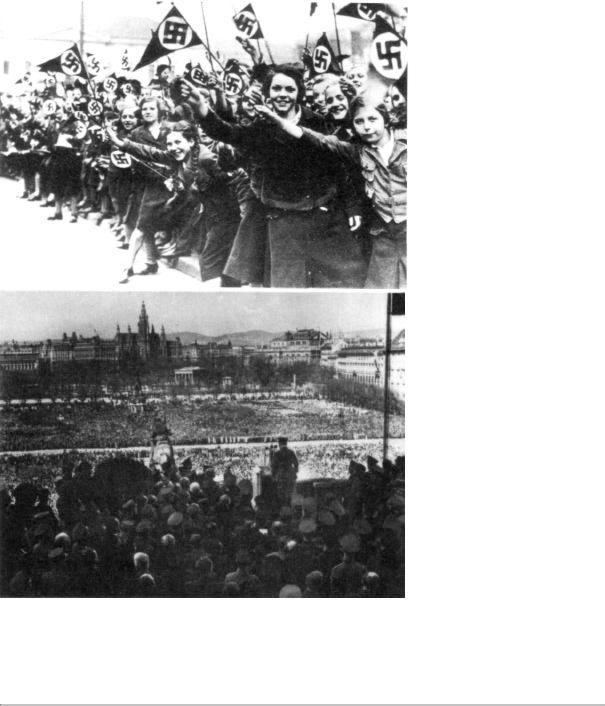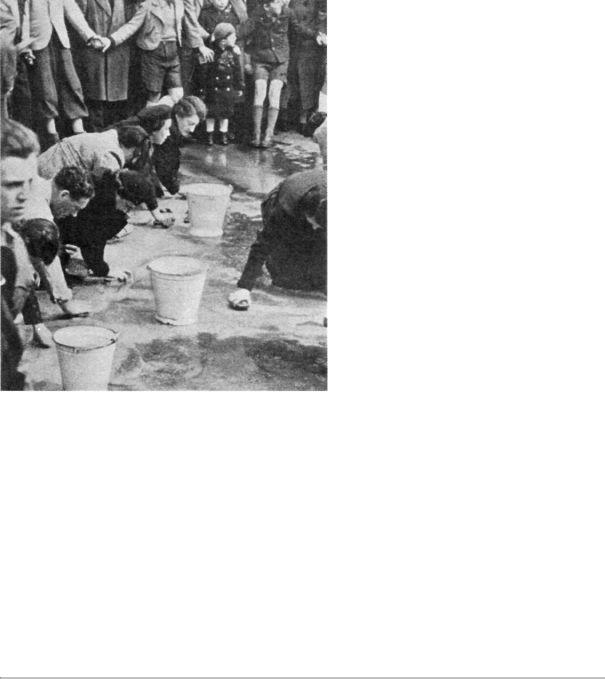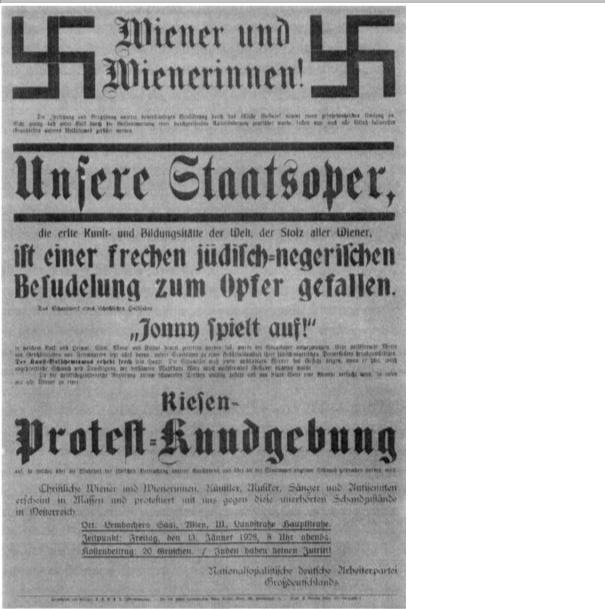
Erik_Kandel_-_V_poiskakh_pamyati_angl
.pdf
science is likely to have practical implications for many areas of health. Yet it goes beyond a search for solutions to devastating illnesses. The new science of mind attempts to penetrate the mystery of consciousness, including the ultimate mystery: how each person's brain creates the consciousness of a unique self and the sense of free will.
2
A CHILDHOOD IN VIENNA
At the time of my birth, Vienna was the most important cultural center in the German-speaking world, rivaled only by Berlin, capital of the Weimar Republic. Vienna was renowned for great music and art, and it was the birthplace of scientific medicine, psychoanalysis, and modern philosophy. In addition, the city's great tradition of scholarship provided a foundation for experiments in literature, science, music, architecture, philosophy, and art, experiments from which many modern ideas were derived. It was home to a diverse collection of thinkers, including Sigmund Freud, the founder of psychoanalysis; outstanding writers, such as Robert Musil and Elias Canetti; and the originators of modern philosophy, including Ludwig Wittgenstein and Karl Popper.
Vienna's culture was one of extraordinary power, and it had been created and nourished in good part by Jews. My life has been profoundly shaped by the collapse of Viennese culture in 1938—both by the events I experienced that year and by what I have learned since about the city and its history. This understanding has deepened my appreciation of Vienna's greatness and sharpened my sense of loss at its demise. That sense of loss is heightened by the fact that Vienna was my birthplace, my home.
2-1 My parents, Charlotte and Hermann Kandel, at the time of their wedding in 1923. (From Eric Kandel's personal collection.)
My parents met in Vienna and married in 1923 (figure 2-1), shortly after my father had established his toy store in the Eighteenth District on the Kutschkergasse (figure 2-2), a lively street that also contained a produce market, the Kutschker Market. My broth7er, Ludwig, was born in 1924 and I five years later (figure 2-3). We lived in a small apartment at Severingasse in the Ninth District, a middleclass neighborhood near the medical school and not far from Berggasse 19, the apartment of Sigmund Freud. As both my parents worked in the store, we had a series of full-time housekeepers at home.

I went to a school on a street appropriately named Schulgasse (School Street), located halfway between our apartment and my parents' store. Like most elementary schools, or Volksschulen, in Vienna, it had a traditional, academically rigorous curriculum. I followed in the footsteps of my exceptionally gifted brother, who had had the same teachers as I. Throughout my childhood in Vienna I felt that Ludwig had an intellectual virtuosity I would never match. By the time I began reading and writing, he was starting to master Greek, to become proficient at piano, and to construct radio sets.
Ludwig had just finished building his first short-wave radio receiver a few days before Hitler's triumphal march into Vienna in
2-2 My parents' toy and luggage store on the Kutschkergasse. My mother with me, or perhaps my brother. (From Eric Kandel's personal collection.)
March 1938. On the evening of March 13, Ludwig and I were listening with earphones as the broadcaster described the advance of German troops into Austria on the morning of March 12. Hitler had followed in the afternoon, crossing the border first at his native village, Braunau am Inn, and then moving on to Linz. Of the 120,000 citizens of Linz, almost 100,000 turned out to greet him, screaming "Heil Hitler" in unison. In the background, the "Horst Wessel song," a hypnotic Nazi marching song that even I found captivating, blared forth on the radio. On the afternoon of March 14, Hitler's entourage reached Vienna, where he was greeted by a wildly enthusiastic crowd of 200,000 people in the Heldenplatz, the great central square, and hailed as the hero who had unified the German-speaking people (figure 2-4). For my brother and me, this overwhelming support for the man who had destroyed the Jewish community of Germany was terrifying.
Hitler had expected the Austrians to oppose Germany's annexation of their country and to demand a relatively independent German protectorate instead. But the extraordinary reception he received, even from those who had opposed him forty-eight hours earlier, convinced

2-3 My brother and I in 1933. I was three years old and Ludwig was eight. (From Eric Kandel's personal collection.)
him that Austria would readily accept—would indeed welcome— annexation. It seemed as if everyone, from modest shopkeepers to the most elevated members of the academic community, now openly embraced Hitler. Theodor Cardinal Innitzer, the influential archbishop of Vienna, once a sympathetic defender of the Jewish community, ordered all the Catholic churches in the city to fly the Nazi flag and ring their bells in honor of Hitler's arrival. Greeting Hitler in person, the cardinal pledged his own loyalty and that of all Austrian Catholics, the majority of the population. He promised that Austria's Catholics would become "the truest sons of the great Reich into whose arms they had been brought back on this momentous day." The archbishop's only request was that the liberties of the Church be respected and its role in the education of the young guaranteed.
That night and for days to come, all hell broke loose. Viennese mobs, both adults and young people, inspired by Austrian Nazis and screaming "Down with Jews! Heil Hitler! Destroy the Jews!" erupted in a nationalistic frenzy, beating up Jews and destroying their property They humiliated Jews by forcing them to get on their knees and scrub the streets to eliminate every vestige of anti-annexation political

2-4 Hitler enters Vienna in March of 1938. He is greeted with great enthusiasm by the crowds, including groups of girls waving Nazi flags emblazoned with swastikas (above). Hitler speaks to the Viennese public in the Heldenplatz (below). The largest turnout in the history of Vienna, 200,000 people, came to hear him. (Photos courtesy of Dokumentationsarchiv des Österreichischer Widerstands and Hoover Institute Archives.)

2-5 Jews forced to scrub the streets of Vienna to remove political graffiti advocating a free Austria. (Courtesy of Yad Vashem Photo Archives.)
graffiti (figure 2-5). In my father's case, he was forced to use a toothbrush to rid Vienna of the last semblance of Austrian independence— the word "yes" scrawled by Viennese patriots encouraging the citizenry to vote for Austria's freedom and to oppose annexation. Other Jews were forced to carry paint buckets and to demarcate stores owned by Jews with the Star of David or with the word Jude (Jew). Foreign commentators, long accustomed to Nazi tactics in Germany, were astonished by the brutality of the Austrians. In Vienna and Its Jews, George Berkley quotes a German storm trooper: "the Viennese have managed to do overnight what we Germans have failed to achieve ... up to this day. In Austria, a boycott of the Jews does not need organizing—the people themselves have initiated it."
In his autobiography, German playwright Carl Zuckmayer, who
had moved to Austria in 1933 to escape Hitler, described Vienna during the days following the annexation as a city transformed "into a nightmare painting of Hieronymus Bosch." It was as if:
Hades had opened its gates and vomited forth the basest, most despicable, most horrible demons. In the course of my life I had seen something of untrammeled human insights of horror or panic. I had taken part in a dozen battles in the First World War, had experienced barrages, gassings, going over the top. I had witnessed the turmoil of the postwar era, the crushing uprisings, street battles, meeting hall brawls. I was present among the bystanders during the Hitler Putsch in 1923 in Munich. I saw the early period of Nazi rule in Berlin. But none of this was comparable to those days in Vienna. What was unleashed upon Vienna had nothing to do with [the] seizure of power in Germany. . . . What was unleashed upon Vienna was a torrent of envy, jealousy, bitterness, blind, malignant craving for revenge. All better instincts were silenced . . . only the torpid masses had been unchained. ... It was the witch's Sabbath of the mob. All that makes for human dignity was buried.

The day after Hitler marched into Vienna, I was shunned by all of my classmates except one—a girl, the only other Jew in the class. In the park where I played, I was taunted, humiliated, and roughed up. At the end of April 1938, all the Jewish children in my elementary school were expelled and transferred to a special school run by Jewish teachers on Pantzergasse in the Nineteenth District, quite far from where we lived. At the University of Vienna, almost all Jews—more than 40 percent of the student body and 50 percent of the faculty— were dismissed. This malevolence toward Jews, of which my treatment was but a mild example, culminated in the horrors of Kristallnacht.
MY FATHER AND MOTHER HAD EACH COME TO VIENNA BEFORE
World War I, when they were very young and the city was a very different, more tolerant place. My mother, Charlotte Zimels, was born in
1897 in Kolomyya, a town of about 43,000 inhabitants on the Prut River in Galicia. This region of the AustroHungarian Empire near Romania was then part of Poland and is now part of Ukraine. Almost half the population of Kolomyya was Jewish, and the Jewish community had a lively culture. My mother came from a well-educated middle-class family. Although she spent only one year at the University of Vienna, she spoke and wrote English in addition to German and Polish. My father, Hermann Kandel—to whom my mother was immediately attracted because she found him handsome, energetic, and filled with humor— was born in 1898 into a poor family in Olesko, a town of about 25,000 near Lvov (Lemberg), also now part of Ukraine. He moved to Vienna with his family in 1903, when he was five. He was drafted directly from high school into the Austro-Hungarian army, fought in the First World War, and sustained a shrapnel wound in battle. After the war, he worked to support himself and never finished high school.
I was born eleven years after the Austro-Hungarian Empire collapsed following its defeat in World War I. Before the war, it was the second largest country in Europe, surpassed in area only by Russia. The empire extended in the northeast to what is now Ukraine, its eastern provinces included what are now the Czech and Slovak republics, and its southern provinces contained Hungary, Croatia, and Bosnia. After the war, Austria was drastically reduced in size, having lost all of its foreign-speaking provinces and retaining only the Germanspeaking core. Consequently, it was greatly reduced in population (from 54 million inhabitants to 7 million) and in political significance.
Still, the Vienna of my youth, a city of almost 2 million people, remained intellectually vibrant. My parents and their friends were pleased when the municipal government, under the leadership of the Social Democrats, initiated a highly successful and widely admired program of social, economic, and health care reforms. Vienna was a thriving cultural center. The music of Gustav Mahler and Arnold Schönberg, as well as that of Mozart, Beethoven, and Haydn, resonated throughout the city, as did the bold expressionist images of Gustav Klimt, Oskar Kokoschka, and Egon Schiele.
Even as it thrived culturally, however, Vienna in the 1930s was the capital city of an oppressive, authoritarian political system. As a child,
I was too young to understand this. It was only later, from the perspective of a more carefree adolescence in the United States, that I understood just how oppressive the conditions that formed my first impressions of the world actually were.
Although Jews had lived in Vienna for over a thousand years and had been instrumental in developing the city's culture, anti-Semitism was chronic. At the beginning of the twentieth century, Vienna was the only major city in Europe where anti-Semitism formed the basis of the political platform of the party in power. Karl Lueger, the anti-Semitic populist mayor of Vienna from 1897 to 1910, focused his spellbinding orations specifically on "the wealthy Jews" of the middle class. That middle class had emerged following the adoption of a new constitution in 1867, which extended equal civil rights to Jews and other minority groups and gave them the freedom to practice their religion openly.

Despite the provisions of the new constitution, the Jews, who made up about 10 percent of the city's overall population and almost 20 percent of its vital core (the nine inner districts), were discriminated against everywhere: in the civil service, in the army, in the diplomatic corps, and in many aspects of social life. Most social clubs and athletic organizations had an Aryan clause that prevented Jews from joining. From 1924 until 1934, when it was outlawed, there existed in Austria a Nazi party with a strongly anti-Semitic platform. The party protested, for example, the performance of an opera by Ernst Krenek, a Jewish composer, at the Vienna Opera House in 1928 (figure 2-6).
Nonetheless, the Jews of Vienna, my parents included, were entranced by the city. Berkley, the historian of Jewish life in Vienna, has commented aptly: "The fierce attachment of so many Jews to a city that throughout the years demonstrated its deep-rooted hate for them remains the greatest grim irony of all." In later years, I learned from my parents why the city exerted such a powerful hold. To begin with, Vienna is beautiful: the museums, the opera house, the university, the Ringstrasse (Vienna's main boulevard), the parks, and the Hapsburg Palace in the city center are all architecturally interesting. The renowned Vienna Woods outside the city are easily accessible, as is the Prater, the almost magical amusement park with its giant Ferris wheel
2-6 An Austrian Nazi party poster from 1928, a decade before Hitler entered Vienna, protests the performance at the Vienna Opera House of an opera by the Jewish composer Ernst Krenek: "Our opera house, the foremost arts and educational

institution in the world, the pride of all Viennese, has fallen victim to an insolent Jewish-Negro defilement. .. protest with us against this unheard-of shame in Austria." (Courtesy of Wiener Stadt-und Landesbibliothek.)
later made famous in the movie The Third Man. 'After an evening at the theater or a May Day in the Prater, a Viennese might with equanimity regard his city as the pivot of the universe. Where else did appearance so beguilingly sweeten reality?" wrote the historian William Johnston. Although my parents were not deeply cultivated people, they felt themselves to be connected to the intellectual values of Vienna, especially to the theatre, the opera, and the city's melodic dialect, a dialect I still speak.
My parents shared the values of most other Viennese parents: they wanted their children to achieve something professionally—ideally, something intellectual. Their aspirations reflected typical Jewish values. Ever since the destruction of the Second Temple in Jerusalem in 70 A.D., when Yohanan ben Zakkai left for the coastal town of Yabneh and established there the first academy for the study of the Torah. Jews have been a people of the book. Every man, irrespective of financial position or social class, was expected to be literate in order to read the prayer book and the Torah. By the end of the nineteenth century, upwardly mobile Jewish parents were encouraging their daughters as well as their sons to become well educated. Beyond that, the goal of life was not simply to achieve economic security, but rather to use economic security to rise to a higher cultural plane. What was most important was Bildung—the pursuit of education and culture. It meant a great deal, even to a poor Jewish family in Vienna, that at least one son succeed in becoming a musician, a lawyer, a doctor, or, better still, a university professor.
Vienna was one of the few cities in Europe where the cultural aspirations of the Jewish community coincided fully with the aspirations of most non-Jewish citizens. After the repeated defeat of Austria's armies by Prussia, first in the War of the Austrian Succession from 1740 to 1748, and then in the Austro-Prussian War in 1866, the Hapsburgs— Austria's ruling family—lost all hope of military predominance among the German-speaking states. As their political and military power waned, they replaced their desire for territorial preeminence with a desire for cultural preeminence. The lifting of restrictions under the new constitution led to a major emigration of Jews and other minority groups from all over the empire to Vienna in the last quarter of the
nineteenth century. Vienna became home to people from Germany, Slovenia, Croatia, Bosnia, Hungary, northern Italy, the Balkans, and Turkey. Between 1860 and 1880, its population increased from 500,000 to 700,000. The middle-class citizens of Vienna began to see themselves as citizens of the world, and they exposed their children to culture early in life. Being reared "in museums, theaters, and concert halls of the new Ringstrasse, the middleclass Viennese acquired culture not as an ornament of life, or a badge of status, but as the air they breathed," wrote Carl Schorske, the cultural historian of Vienna. Karl Kraus, the great satirical social and literary critic, said of Vienna that "its streets are not paved with asphalt but with culture."
In addition to being culturally vibrant, Vienna was also alive sensually. My fondest early memories are typically Viennese: one, a modest but sustained bourgeois contentment that came from being raised within a close-knit and supportive family that shared holidays in a regular, prescribed manner, and the other, a moment of erotic happiness that came naturally from our seductive housekeeper, Mitzi.
That erotic experience was right out of one of Arthur Schnitzler's short stories, wherein a young, middle-class Viennese adolescent is introduced to sexuality by ein süsses Mädchen, a sweet young maiden, either a servant in the house or a working girl outside the house. Andrea Lee, writing in The New Yorker, has said that one of the criteria bourgeois families in Austria-Hungary used in selecting girls for housework was that they be suitable to relieve the family's adolescent boys of their virginity, in part to entice them away from any possible attraction to homosexuality. I find it interesting to look back and realize that an encounter that easily could have become, or could have been perceived by others as being exploitative, never had that connotation for me.

My encounter with Mitzi, an attractive, sensual young woman of about twenty-five, began one afternoon as I was recovering from a cold at age eight. She sat down at the edge of my bed and touched my face. When I responded with pleasure, she opened her blouse, exposing her ample bosom, and asked me whether I would like to touch her. I barely grasped what she was talking about, but her attempt at seduction had its effect on me, and I suddenly felt different than I ever had before.
As I began with some guidance to explore her body, she suddenly
became uncomfortable and said we had better stop or I'd become pregnant. How could I become pregnant? I knew full well that only women have babies. Where can a baby come from in boys?
"From the belly button," she answered. "The doctor puts some powder on it, and the belly button opens up to allow the baby to come out."
Part of me knew this was impossible. But part of me was not certain—and even if it seemed improbable, I became slightly anxious at the potential consequences of that event. My worry was, What would my mother think if ever I were to become pregnant? That worry and Mitzi's change of mood ended my first sexual encounter. But Mitzi continued thereafter to speak freely to me about her sexual yearnings and said that she might have realized them with me were I older.
Mitzi did not, as it turned out, remain celibate until I reached her age qualifications. Several weeks after our brief rendezvous in my bed, she took up with a gas repairman who came by to fix our stove. A month or two later, she ran off with him to Czechoslovakia. For many years thereafter, I thought that running off to Czechoslovakia was the equivalent of devoting one's life to the happy pursuit of sensuality.
Our bourgeois familial happiness was typified by the weekly card game at my parents' house, family gatherings on the occasion of Jewish holidays, and our summer vacations. On Sunday afternoons my Aunt Minna, my mother's younger sister, and her husband, Uncle Srul, would come for tea. My father and Srul would spend most of the time playing pinochle, a card game at which my father excelled and which he played with great animation and humor.
Passover was a festive occasion that brought our family together at the home of my grandparents, Hersch and Dora Zimels; we read the Haggadah, an account of the escape of the Jews from slavery in Egypt, and then enjoyed one of my grandmother's carefully prepared seder meals, the high point of which was her gefilte fish, which to my mind still has no equal. I particularly remember the Passover of 1936. A few months earlier, Aunt Minna had married Uncle Srul, and I was an attendant at her wedding—I helped manage the train of her beautiful gown. Srul was quite wealthy. He had developed a successful leather business, and his wedding to Minna was elaborate in a way I had not previously experienced. I was therefore very pleased with my role in it.
On the first night of Passover, I recalled fondly for Minna how much I had enjoyed their wedding with everyone dressed so nicely and food served in an elegant way. The wedding was so beautiful, I said, that I hoped she would have another soon so I could experience a special moment like that again. Minna, as I learned later, felt somewhat ambivalent about Srul. She considered him her intellectual and social inferior and therefore immediately assumed that I was referring not to the event but to her choice of partner. She inferred that I would like to see her remarried to someone else—someone perhaps more appropriately matched to her intellect and breeding. Minna became enraged and lectured me at length on the sanctity of marriage. How dare I suggest that she would want another wedding so soon, to marry someone else? As I was to learn later, in reading Freud's Psychopathology of Everyday Life, a fundamental principle of dynamic psychology is that the unconscious never lies.
Every August my parents, Ludwig, and I spent our summer holidays in Mönichkirchen, a small farming village fifty miles south of Vienna. Just as we were about to depart for Mönichkirchen in July 1934, the Austrian chancellor, Engelbert Dollfuss, was assassinated by a band of Austrian Nazis disguised as policemen—the first storm to register on my emerging political consciousness.

Modeling himself on Mussolini, Dollfuss, who had been elected chancellor in 1932, had absorbed the Christian Socialists into the Fatherland Front and established an authoritarian regime, choosing as an emblem a traditional form of a cross rather than the swastika, to express Christian rather than Nazi values. To ensure his control of the government, he had abolished Austria's constitution and outlawed all opposition parties, including the Nazis.
Although Dollfuss opposed the efforts of the Austrian National Socialist movement to form a state consisting of all German-speaking people—a pan-German state—his abolition of the old constitution and competing political parties helped open the door for Hitler. Following Dollfuss's assassination and during the early years of the chancellorship of his successor, Kurt von Schuschnigg, the Austrian Nazi party was driven further underground. It nonetheless continued to gain new adherents, especially among teachers and other civil servants.
HITLER WAS AUSTRIAN AND HAD LIVED IN VIENNA. HE HAD LEFT
his childhood home in Braunau am Inn for the capital in 1908, at age nineteen, hoping to become an artist. Despite a reasonable talent for painting, he failed repeatedly to gain entrance to the Art Academy of Vienna. While in Vienna, he came under the influence of Karl Lueger. It was from Lueger that Hitler first learned the power of demagogic oratory and the political benefits of antiSemitism.
Hitler had dreamed of a union of Austria and Germany since his youth. Consequently, from its very beginning in the 1920s, the agenda of the Nazi party, which was framed in part by Austrian Nazis, included the merger of all German-speaking people into a Greater Germany. In the fall of 1936 Hitler began to act on this agenda. In full control of Germany since 1933, he had reinstated conscription in 1935, and the next year he had ordered his troops to reoccupy the Rhineland, a German-speaking region that had been demilitarized and placed under French supervision by the Treaty of Versailles. He then intensified his rhetoric, threatening to move against Austria. Schuschnigg was eager to appease Hitler while ensuring Austria's independence, and he responded to the threats by requesting a meeting with Hitler. On February 12, 1938, they met in Berchtesgaden, the private retreat Hitler had selected, for sentimental reasons, to be close to the Austrian border.
In a show of power, Hitler arrived at the meeting with two of his generals and threatened to invade Austria unless Schuschnigg lifted the restrictions on the Austrian Nazi party and appointed three Austrian Nazis to key ministerial posts in the cabinet. Schuschnigg refused. As the day wore on, however, Hitler stepped up the pressure. Finally the exhausted chancellor gave in, agreeing to legalize the Nazi party, free Nazis held as political prisoners, and grant the Nazi party two cabinet positions. But the agreement between Schuschnigg and Hitler only whetted the Austrian Nazis' appetite for power. Now a sizable group, they emerged into public view and challenged Schuschnigg's government in a series of insurgencies that the police had difficulty controlling. Faced with Hitler's threatened aggression from without and the rebellion of the Austrian Nazis from within, Schuschnigg took the offensive and boldly called for a plebiscite to be held on March 13, a
mere month after his meeting with Hitler. The question for the voters was simple: Should Austria remain free and independent, yes or no?
This courageous move by Schuschnigg, much admired by my parents, unsettled Hitler, as it seemed almost certain that the vote would favor an independent Austria. Hitler responded by mobilizing troops and threatening to invade the country unless Schuschnigg postponed the plebiscite, resigned as chancellor, and formed a new government with an Austrian Nazi, Arthur Seyss-Inquart, as chancellor. Schuschnigg turned for help to Britian and Italy, two countries that had formerly supported Austrian independence. To the dismay of Viennese liberals like my family neither responded. Abandoned by potential allies and concerned about needless bloodshed, Schuschnigg resigned on the evening of March 11.
